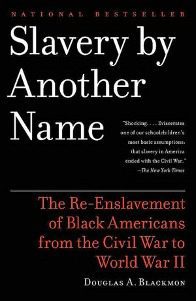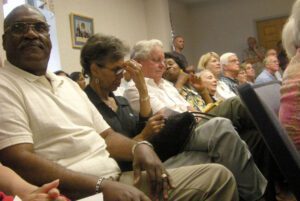At a time when the national conversation is focused on race relations, Mary Baldwin University is co-hosting with the larger Staunton community a series of events to foster discussion on campus and throughout the area.
“Lift Every Voice: Conversations About Race” includes the screening of the 2012 PBS film Slavery By Another Name at 7 p.m. January 18 in Miller Chapel and a dialogue with Douglas Blackmon, Pulitzer Prize-winning author of the book that inspired the PBS documentary at 7 p.m. January 28 in Francis Auditorium. Both events are free and open to the public.
Blackmon is a much-sought-after lecturer on race, history, and social memory. In Spring 2010, he was invited by Attorney General Eric Holder to present to senior Department of Justice officials in Washington D.C. He also has lectured at Harvard School of Law, Yale University, Princeton, the New School, Emory University, Vanderbilt School of Law, the Clinton and Lincoln presidential libraries, and many other institutions.
Associate Professor of History Amy Tillerson, who helped organize the events, said she uses Blackmon’s book, Slavery by Another Name — a searing examination of how the enslavement of African Americans persisted deep into the 20th century — and the documentary based on his research in her African-American history courses. She reached out to Blackmon to join the dialogue after a group of Mary Baldwin faculty, representatives from Staunton City Council, and representatives from other local organizations met to plan a community forum in the wake of the shooting of African-American teenager Michael Brown in Ferguson, Missouri.

The workshops were designed to discuss issues related to mass incarceration of black Americans and the disconnect between community members and law enforcement organizations. The idea evolved from a series of workshops organized by Staunton Vice-Mayor Ophie Kier and co-moderated by Tillerson. One was in response to the George Zimmerman verdict and another was held to address issues related to public school educational opportunities.
Planning the events has been a team effort. According to Tillerson, there are 14 people on the planning committee that includes a mix of Mary Baldwin community members, elected officials, local activists, and members of the clergy.
“This is exactly the kind of event that we like to see — one that brings the college and community together for discussion and understanding of issues that affect us all,” said Steve Grande, director of Mary Baldwin’s Spencer Center for Civic and Global Engagement, one of the committee members.
“Our committee realizes that racism continues to plague our lives in the United States. We see and feel how deeply its tentacles reach and we are confused, at best, by recent trends to legitimize the myth of a ‘post-racial’ society,” Tillerson said. “While we want very much to live in harmony with people despite racial differences, it is difficult to move past this when those with power and privilege are able to render invisible the realities that so many marginalized, disenfranchised people, typically black and brown, see daily.”
Planners hope the upcoming events will not only present new information and provide different perspectives from which to view historical and contemporary issues but also sustain productive community conversations that include a cross-section of people in this area. They hope to host regular film/documentary viewings and discussions that will provide further opportunities for the community to communicate about issues related to racism.
Blackmon’s book was awarded the 2009 Pulitzer Prize for General Non-Fiction. It was a New York Times bestseller in both hardback and soft-cover editions and was awarded a 2009 American Book Award. In addition to that work, Blackmon is a contributing editor at The Washington Post and chair and host of Forum, a public affairs program produced by the University of Virginia’s Miller Center. Blackmon has written extensively over the past 25 years about the American quandary of race — exploring the integration of schools during his childhood in a Mississippi Delta farm town, lost episodes of the Civil Rights movement, and, repeatedly, the dilemma of how a contemporary society should grapple with a troubled past. He lives in Charlottesville and Atlanta.